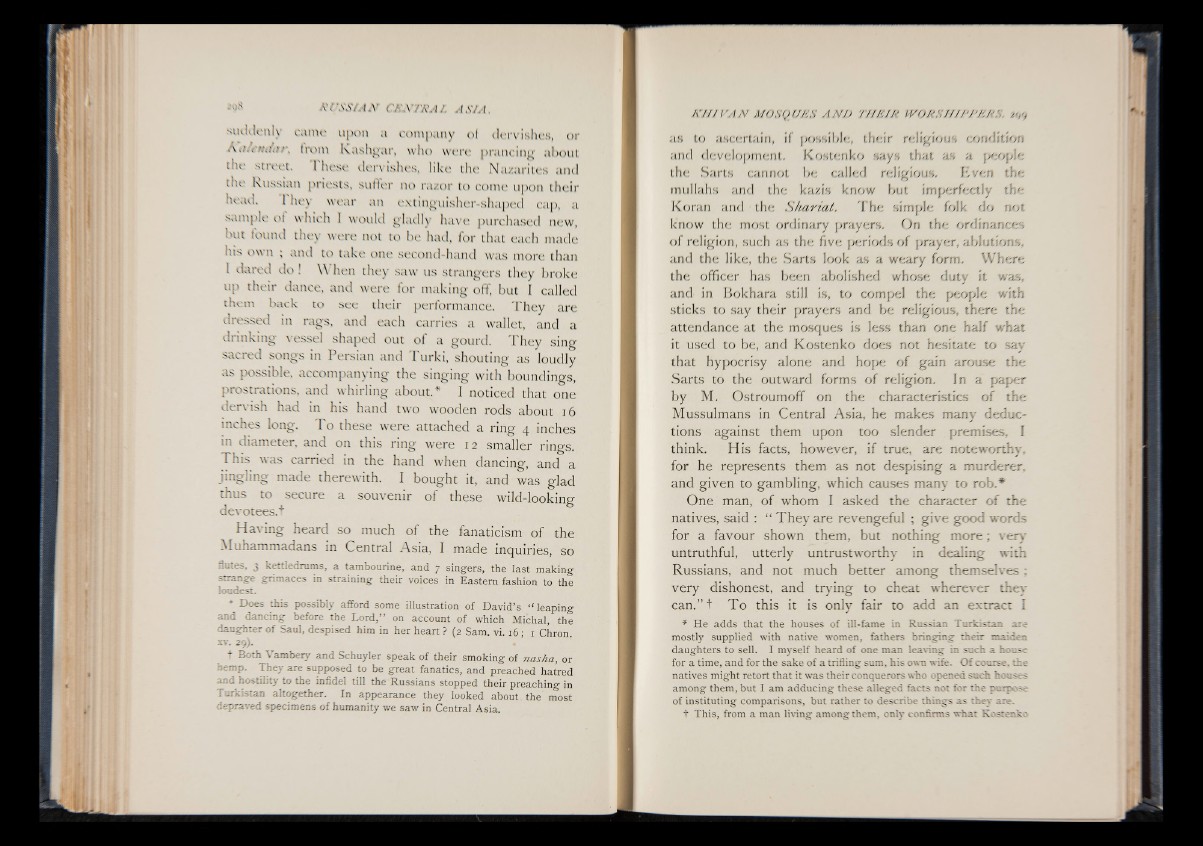
suddenly came upon a company of dervishes, or
A » from Kashgar, who were prancing about
the street, 1 hose dervishes, like the Nazarites and
the Russian priests, suffer no razor to come upon their
head, 1 hey wear an extinguisher-shaped cap, a
sample of which 1 would gladly have purchased new,
but found they were not to be had, for that each made
his own ; and to take one second-hand was more than
I dared do ! \\ hen they saw us strangers they broke
up their dance, and were for making off, but I called
them back to see their performance. They are
dressed in rags, and each carries a wallet, and a
drinking vessel shaped out of a gourd. They sing
sacred songs in Persian and Turki, shouting as loudly
as possible, accompanying the singing with boundings,
prostrations, and whirling about.* I noticed that one
dervish had in his hand two wooden rods about 16
inches long. T o these were attached a ring 4 inches
in diameter, and on this ring were 12 smaller rings.
This was carried in the hand when dancing, and a
jingling made therewith. I bought it, and was glad
thus to secure a souvenir o f these wild-looking
devoteesT
Having heard so much of the fanaticism of the
Muhammadans in Central Asia, I made inquiries, so
Antes, 3 kettledrums, a tambourine, and 7 singers, the last making
strange grimaces in straining their voices in Eastern fashion to the
loudest.
* Does this possibly afford some illustration of David’s “ leaping
and dancing before the Lord,” on account of which Michal, the
daughter of Saul, despised him in her heart ? (2 Sam. vi. 16 ; 1 Chron.
xv. 29).
f Both Vambeiy and Schuyler speak of their smoking of nasha, or
hemp. They are supposed to be great fanatics, and preached hatred
and hostility to the infidel till the Russians stopped their preaching in
Turidstan altogether. In appearance they looked about the most
depraved specimens of humanity we saw in Central Asia.
as to ascertain, if possible., their religious condition
and development. Kostenko says that as a people
the Sarts cannot be called religious. Even the
mullahs and the kazis know but imperfectly the,
Koran and the Shariat. T he simple folk do not
know the most ordinary prayers. On the ordinances
o f religion, such as the five periods of prayer, ablutions,
and the like, the Sarts look as a weary form. Where
the officer has been abolished whose duty it was,
and in Bokhara still is, to compel the people with
sticks to say their prayers and be religious, there the
attendance at the mosques is less than one half what
it used to be, and Kostenko does not hesitate to say
that hypocrisy alone and hope of gain arouse the
Sarts to the outward forms of religion. In a paper
by M. Ostroumoff on the characteristics o f the
Mussulmans in Central Asia, he makes many deductions
against them upon too slender premises, I
think. His facts, however, if true, are noteworthy,
for he represents them as not despising a murderer,
and given to gambling, which causes many to rob.*
One man, of whom I asked the character o f the
natives, said : “ T h e y are revengeful ; give good words
for a favour shown them, but nothing mo re : very
untruthful, utterly untrustworthy in dealing with
Russians, and not much better among themselves:
very dishonest, and trying to cheat wherever they
can.” t T o this it is only fair to add an extract I
* He adds that the houses of ill-fame in Russian Tuikistan are
mostly supplied with native women, fathers bringing their maiden
daughters to sell. I myself heard of one man leaving in such a house
for a time, and for the sake of a trifling sum, his own wife. Of course, the
natives might retort that it was their conquerors who opened such houses
among them, but I am adducing these alleged facts not for the purpose
of instituting comparisons, but rather to describe things as they are.
t This, from a man living among them, only confirms what Kostenko